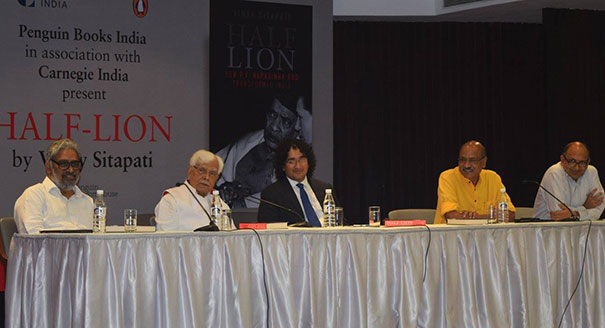Registration
You will receive an email confirming your registration.
Carnegie India, in collaboration with Penguin Random House, hosted the launch of Half Lion, a biography of former prime minister of India, P.V. Narasimha Rao. The book was writen by Vinay Sitapati, who works at the India International Centre, New Delhi. A collection of personal papers, interviews, and archival material, Half Lion is a depiction of how Rao transformed India’s economic landscape.
Shri M. Hamid Ansari, vice president of India, introduced the book. He was followed by a panel discussion with Shri K. Natwar Singh, former external affairs minister of India, C. Raja Mohan, director of Carnegie India, Pratap Bhanu Mehta, president of the Centre for Policy Research, and Shekhar Gupta, editor-in-chief of the Print. The author Vinay Sitapati moderated the panel.
DISCUSSION HIGHLIGHTS
- Keynote Remarks: In his keynote, Vice President Ansari described former prime minister Rao as a man who initiated change in basic economic policies, made commendable judgments on the selection of key personnel, and who manuevered his changed deftly through a divided polity. In particular, he recalled the aftermath of the budget of July 1991, when Rao made realistic assessments of the shiftnig patterns in global power and adjusted economic policy to meet India’s immediate needs. He descibred the book as “diligently researched” and a useful contribution to Indian contemporary history.
- India Under Rao’s Leadership: Mohan emphasized the importance of both the man and the moment in bringing about economic reforms at a time when the system was breaking down. He recalled Rao’s role in leading the nuclear weapons program and expanding outreach to the United States. Gupta added that Rao had to deal with his own political party, industrialists, and even a strong opposition at that time. Mehta and Sitapati both commended Rao’s skills in managing backroom politics and leading a minority government and his sharp political acumen.
- Leaving a Legacy: The panel was unanimous in appreciating Rao’s legacy in reordering Indian economy, calming the turbulent frontiers, and reshaping Indian foreign policy, all under highly demanding circumstances at home and abroad. They also scrutinized two moments of particular tension during his political career, his failures to prevent both the destruction of the Babri Masjid and the riots against Sikhs after the assassination of Indira Gandhi in 1984.
- On Ideology: Sitapati posed the question of whether Rao was an idealist, a realist, or an opportunist. Panelists debated this question, some noting his socialist orientation and the land reforms he enacted as the chief minister of Andhra Pradesh while others pointed to the fact that the Congress Party itself had continuously evolved in the post-independence period and Rao encapsulated that change. They agreed that Rao was a cynic who managed to not only gain power but hold onto it to a full term and preside over India’s transformation.
- One of India’s Most Consequential Prime Ministers: Sitapati argued that Rao was the most consequential Indian prime minister after Jawaharlal Nehru, an argument that some of the panelists disagreed with. Noting that it was not a question of comparison Mohan said Rao will always be remembered for presiding over the transition away from the core premises of the Nehruvian era.
This event summary was prepared by Neha Dewan and Arjun Jaishankar, interns at Carnegie India
